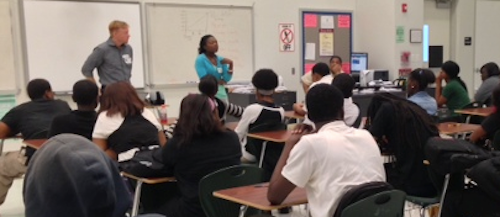“Come here, faggot.” It was my first year teaching Algebra II at Miami Central Senior High School, and a security guard was calling for a student in my classroom. Afterwards, I talked to my students about how words like “faggot” can hurt people and were not acceptable in my classroom. However, the incident left me worried for my students. I wanted to do more to protect them from harassment around gender and orientation; it took me a year to figure out how.
Miami Central, a low-income high school with textbook shortages and class sizes of up to forty-five, can be a challenging place for students. Compounding the lack of resources, students face frequent bullying around gender and orientation. Every day I hear students call each other “fag,” “booger” (a term for gay), and “shone” (a term for a promiscuous girl.) One of my students told me that after he got into an argument with a teacher, she called him “gay boy” to the other students.
Gender and orientation slurs contribute to the larger problems of violence, school absences, and teen pregnancy that stand in the way of Miami Central students’ success. Male students feel pressure to prove their masculinity by fighting, resulting in suspension and lost learning time. At least five of my female students this year are pregnant or already have a child.
My students have big dreams and plan to be obstetricians, accountants, and lawyers. Some of them take three buses or walk an hour to get to school. Some of them work full-time jobs after school. I am committed to creating a school environment where they feel safe to be themselves and can concentrate on learning.
My second year at Miami Central, I decided to address bullying by inviting YES Institute to Central. After a month of persistence, and with the help of the assistant principal and the TRUST Counselor, I arranged for YES Institute to present to six Algebra II classes. The speaker, Ebony, shared that hearing orientation slurs as a teenager made her afraid to come out and contributed to her drug problems later in life. I wasn’t sure how my students would react to the presentation, but they were moved by Ebony’s story and asked thoughtful questions about gender and orientation.
These presentations are just the beginning of a new conversation at Miami Central. I’m excited for students and staff to engage in more dialogue about gender and orientation. Through opening communication on these topics, students and staff can work together to make the school a safer place that fosters student achievement and well-being.
 |
| Joseph and Ebony share about YES Institute with Miami Central students |
